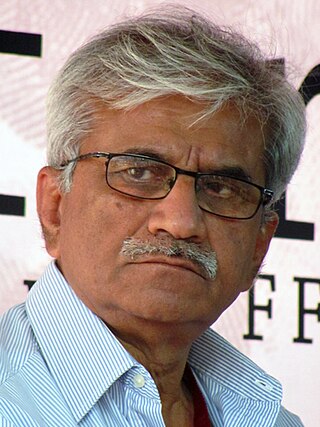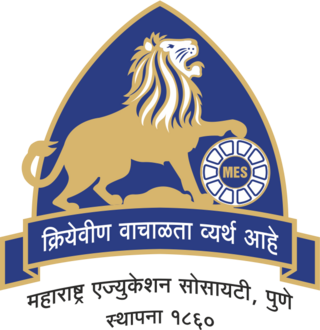
Vijay Dhondopant Tendulkar was a leading Indian playwright, movie and television writer, literary essayist, political journalist, and social commentator primarily in Marathi. His Marathi plays established him as a writer of plays with contemporary, unconventional themes. He is best known for his plays Shantata! Court Chalu Aahe (1967), Ghashiram Kotwal (1972), and Sakharam Binder (1972). Many of Tendulkar's plays derived inspiration from real-life incidents or social upheavals, which provide clear light on harsh realities. He has provided guidance to students studying "play writing" in US universities. Tendulkar was a dramatist and theatre personality in Maharashtra for over five decades.

Fergusson College is an autonomous public-private college offering various courses in the streams of arts and science in the city of Pune, India. It was founded in 1885 by the Vaman Shriram Apte, Bal Gangadhar Tilak, Vishnushashtri Chiplunkar, Mahadeo Ballal Namjoshi and Gopal Ganesh Agarkar. Professor Vaman Shivram Apte was its first principal. Social reformer, journalist, thinker and educationist Gopal Ganesh Agarkar served as the second principal from August 1892, till his death in June 1895.
Vasudev Balwant Phadke was an Indian independence activist and revolutionary who sought India's independence from colonial rule. Phadke was moved by the plight of the farming community and believed that Swaraj was the only remedy for their ills. With the help of various sub-communities of Hindu society he created a movement against British rule. The group started an armed struggle to overthrow the colonial government, launching raids on wealthy European businessmen to obtain funds for the purpose. Phadke came to prominence when he got control of the city of Pune for a few days after catching colonial soldiers off-guard during a surprise attack.

Dr. Jabbar Patel is a former paediatrician and a Marathi-language theatre and film director of India. His production of Vijay Tendulkar's play Ghashiram Kotwal, in 1973 is considered a classic in Modern Indian Theatre. Patel received Filmfare Marathi Lifetime Achievement Award at 7th Filmfare Awards Marathi.
Jaywant Dalvi was a prominent contemporary Marathi writer in Maharashtra.
Khatav is a town and taluka located in the Man-Khatav subdivision of the Satara district, India.

Vishnudas Bhave and was the leading dramatist of Maharashtra, India and considered as pioneer of Marathi theatre. He was born in Sangli and he staged the first Marathi-language play Sita Swayamvar in Sangli in 1843. In this venture, Bhave was supported by the then king of the princely state of Sangli. After the success of the play Sita Swayamvar, Bhave staged plays on various other episodes of the Ramayana. He traveled with his troupes for the plays. He also ventured into puppet shows. Bhave died on 9 August 1901.
Vinayaka, or Ganesha, is the Hindu god of new beginnings, success, and wisdom.

Maharashtra State Film Awards, one of the prestigious awards of Marathi cinema, are awarded by the Government of Maharashtra to Marathi language films and artists. They were first awarded in 1963.

Abasaheb Garware College of Arts and Science is a college located in Pune, India. It is run by the Maharashtra Education Society, a private education institution founded by Vasudeo Balwant Phadke, Vaman Prabhakar Bhave and Laxman Narhar Indapurkar in 1860. The college was established in 1945 and named as "M.E.S College of Arts and Science". It was renamed to its present name in 1970s after a charitable donation by the industrialist Abasaheb Garware to the society.
Pandurang Vasudeo Sukhatme (1911–1997) was an Indian statistician. He is known for his pioneering work of applying random sampling methods in agricultural statistics and in biometry, in the 1940s. He was also influential in the establishment of the Indian Agricultural Statistics Research Institute. As a part of his work at the Food and Agriculture Organization in Rome, he developed statistical models for assessing the dimensions of hunger and future food supplies for the world. He also developed methods for measuring the size and nature of the protein gap.

Vinayak Pandurang Karmarkar (1891–1967), popularly known as Nanasaheb Karmarkar was an Indian artist, famous for his sculptures. He is best known for his statues of Chhatrapati Shivaji Maharaj. Karmarkar Museum of Sculpture has been set up at his house in Sasawane village near Alibag. Located 18 kms from on Alibaug-Rewas Road, Maharashtra, India, is a museum where sculptors made by Late Mr. Nanasaheb Karmarkar are displayed in his own bungalow. There about 150 beautifully carved sculptures displayed here.
Suhas Pandurang Sukhatme is an Indian scientist, teacher, author and a former Chairman of the Atomic Energy Regulatory Board of the Government of India, known for his expertise in heat transfer and energy technologies. He was honoured by the Government of India, in 2001, with the fourth highest Indian civilian award of Padma Shri.

The Maharashtra Education Society (MES) is one of the oldest private education institutions in Pune, India. It was founded in 1860 as the Poona Native Institution by Waman Prabhakar Bhave, Laxman Nahar Indapurkar, and the revolutionary leader Vasudeo Balwant Phadke.
Prin. Dr. P. B. Patil was a member of the Sangli Assembly constituency of the Maharashtra Legislative Assembly (1972-1978), a social reformer who worked for the cause of education and rural development in Maharashtra, India. He was born in a small farmer's family in Chikurde village of Walwa Taluka in Sangli district, Maharashtra, India.








